Original URL: https://www.theregister.com/2011/11/25/climategate_symptoms/
Climategate: A symptom of driving science off a cliff
You just couldn't make it up
Posted in Science, 25th November 2011 14:41 GMT
Analysis I got some pushback from readers on the more skeptical side of the climate issue for describing Climategate as 'a tragedy'. There was clear evidence of cynicism and dishonesty, they argue - doesn't this let them off the hook? Not at all. But we need the bigger picture. Let's try this as a thought exercise.
Demonising or exonerating individuals, based on fragments from emails, only takes us so far. One of the striking things about the exchanges is that the climate scientists' private behaviour was so different to their public statements.
Why would this be? Just as the characters in 19th and early 20th century naturalistic novels were trapped by their circumstances, we may look at the circumstances around Climategate to explain the political mechanics of the time.
The second archive FOIA2011.ZIP is much broader than the first, and shows a high volume of detailed interaction between civil servants and the scientists. There's little doubt already that the East Anglia emails will become a primary source for future historians to try to understand public policy-making in this period. The archive spans a period from 1996 to 2009, when global warming went to the top of the policy agenda, and it appears that almost every significant email sent to and from this institute that was archived over this period will now be made public.
Climate science broke away from meteorology in the early seventies. The Met Office's Professor HH Lamb set up the Climatic Research Unit at the University of East Anglia in 1972, making CRU a pioneer. But what happened to "climate science" over this period is merely an analogue of what took place in other fields. The relationship between science and public policy making is now very different to what it was 40 years ago, and climate research reflects those changes.
What we see now is a dynamic that looks rather like this. I have used a non-climate example. It's a circular process, that feeds in on itself, your preferred 'starting point' may be at any point of the cycle. I have chosen one in particular, because it will be very familiar to you: it's the pattern several major science stories have followed in recent years.
Firstly. An obscure researcher or scientist will make a dramatic claim.
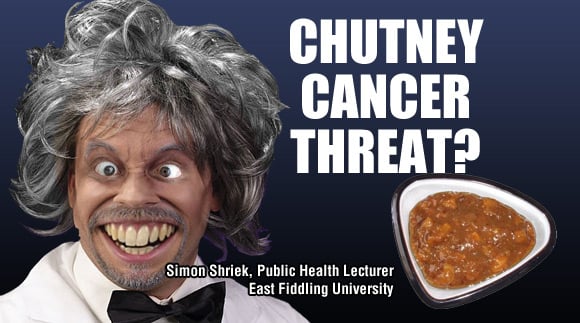
The media picks up on this, and a reporter is assigned to the story. The reporter will have no scientific background – but looks to the state and the bureaucracy to do something. Anything.
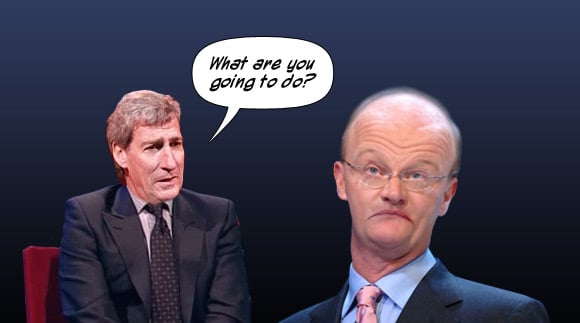
The hapless minister is then hauled on to explain the inaction. He will be intelligent – he is likely to have a PPE from Oxford, like the presenter – but no specialist knowledge. He, too, trusts the scientists.
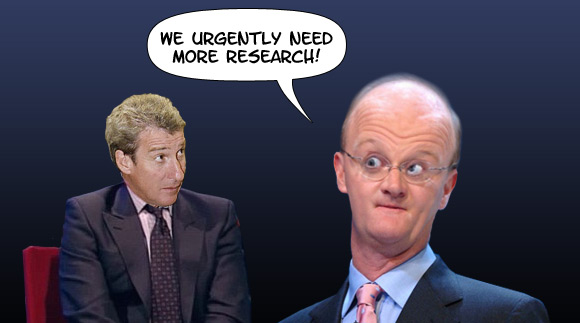
A pledge is then made to increase funding for the scientist who makes the claim.
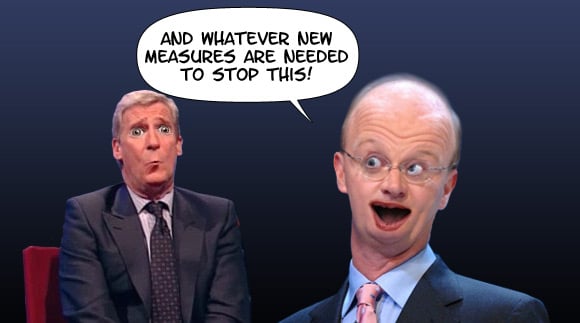
A pledge is also made to act – by introducing legislation or other regulations. Perhaps a task force or committee will also be involved:
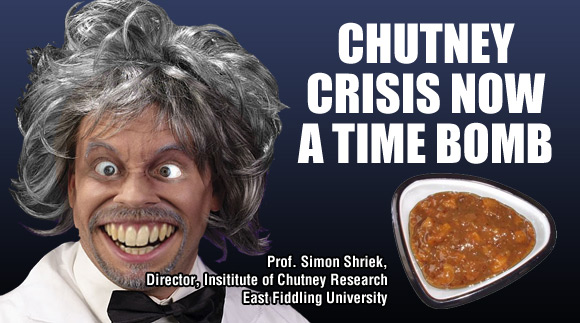
Illustrations: Andy Davies
The bandwagon is now rolling.
Passive Drinking – and other lucrative alarms
It doesn't actually matter if the original story had any merit. The great GM Food scare was based on research for which Dr Arpad Pusztai was later suspended. His results couldn't be reproduced. The paper on which the MMR vaccine scare was based was eventually withdrawn, and the authors struck off. A perennial example is "alcohol research", which has spawned a significant junk science industry, which plays down the health benefits and exaggerates the dangers [example]. It's used as the basis for policies such as minimum alcohol pricing.
Politicians desire to "do something" offers health and environment researchers an almost unlimited field.
The process was details in John Brignell's explanation of junk science in Sorry, Wrong Number, which describes the corruption of epidemiology. Until 30 years ago, science journals would not publish results indicating a relative risk (RR) ration of under 3.00. An RR of below 3.00 did not indicate sufficient causation. It may be a coincidence. But that iron law was gradually lifted – and epidemiology expanded enormously. One of the examples of publication bias Brignall used to highlight on his Numberwatch blog was "passive drinking". But life overtakes satire: passive drinking is now a clear and present danger.
What took place in climate science falls into this pattern. While in private, the scientists despair of their lack of understanding of the chaotic physics of climate, and are scathing about the quality of temperature reconstructions (for example), they are faced with constant demands from the bureaucracy and the media to tell a convincing story. Groupthink takes over, and evidence to the contrary is shunned, and scientists who advance it ostracised or smeared.
"I can't overstate the HUGE amount of political interest in the project as a message that the Government can give on climate change to help them tell their story. They want the story to be a very strong one and don't want to be made to look foolish," pleads a DEFRA bureaucrat in an email to CRU.
For the system to work properly, each stage – the media, the political class (politicians and their bureaucrats) and the scientists – need to be doing their job properly. The scientists may say they are merely feeding a demand. The media say they're irresponsible if they don't cover every potential alarm – and anyway, who wants to hear good news stories? Politicians are looking for a quick issue to "deal with" (and be seen to be acting decisively). And bureaucrats do what bureaucrats do – find new empires. Perhaps the only difference with climate was the immense amount of funding that's been available.
Just yesterday, a press release dropped into my inbox. The subject line reads "Delivering Sustainable Theatres. The challenge of achieving the triple bottom line" and reports on exciting progress made at the sixth Delivering Sustainable Theatres Conference. I shall spare you the full details – a sample of the prose should suffice ...
What we clearly and urgently need to do now is establish how we take the three pillars of sustainable development – economic, social and environmental – and relate these to a theatre’s ability to sell a unique cultural experience and make sure our theatre buildings have the capacity to deliver what’s needed for today, and into the future.
A small note thanks the seven-year funding commitment from the ERDF, the European Regional Development Fund.
My point is that enormous resources are being devoted to dubious ends – and that this is a systemic failure. Scientists are human beings too, and so plainly capable of human foibles. Demonise the individual and the problem doesn't go away.
Over to you. ®